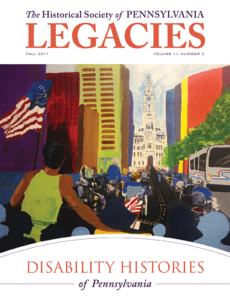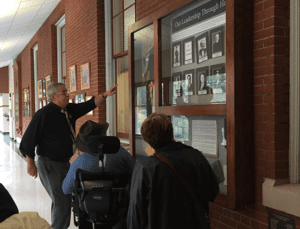Sierra Green and Emily Ruby of the Heinz History Center recently met with Aaron and Chris Noschese at the Western Pennsylvania School for the Deaf to discuss preservation. Green, Ruby, and Chris … [Read more...] about Heinz archivists share expertise with Western Pennsylvania School for the Deaf
News
Employment First bill passes Pa. House, moves to Senate
On December 11, the Pennsylvania House of Representatives passed the Employment First legislation long supported by disability advocates. The bill now moves to the Pennsylvania Senate as Senate Bill … [Read more...] about Employment First bill passes Pa. House, moves to Senate
Documentary explores pioneer whose ideas set path to deinstitutionalization
More than 40 people gathered to watch Valuing Lives: Wolf Wolfensberger and the Principle of Normalization on December 19. A wide-ranging discussion after the documentary covered the continuing … [Read more...] about Documentary explores pioneer whose ideas set path to deinstitutionalization
Pitt researcher seeks people with disabilities for survey about internet use
A University of Pittsburgh PhD student is seeking people with disabilities to take survey about how they use (or don’t use) internet-connected devices such as smart phones, computers, or … [Read more...] about Pitt researcher seeks people with disabilities for survey about internet use
“Journey of Inclusion” examines the college experience for students with disabilities
The Pennsylvania Inclusive Higher Education Consortium is offering a symposium on “The Journey of Inclusion: Experiencing the College Years” on January 8 at Hershey Lodge in Hershey, Pa. The one-day … [Read more...] about “Journey of Inclusion” examines the college experience for students with disabilities
Teen volunteers at Friendship Circle learn about the history of disability in the U.S
Tina Calabro and Holly Dick, Consortium steering committee members, spoke recently about the history of disability rights to teen volunteers at the Friendship Circle in Squirrel Hill. The teens have … [Read more...] about Teen volunteers at Friendship Circle learn about the history of disability in the U.S
Join us Dec. 19 for free documentary event
The Institute on Disabilities at Temple University presents the film Valuing Lives: Wolf Wolfensberger and the Principle of Normalization from 9:30 a.m.-noon, Tuesday, December 19 at Rodef … [Read more...] about Join us Dec. 19 for free documentary event
Historical Society of Pennsylvania publishes disability history magazine
The Historical Society of Pennsylvania devoted the most recent edition of their Legacies magazine to disability history. As with so many minority groups, people with disabilities have been largely … [Read more...] about Historical Society of Pennsylvania publishes disability history magazine
Valuing Lives documentary, panel discussion will be Dec. 19
The Institute on Disabilities at Temple University presents the documentary Valuing Lives: Wolf Wolfensberger and the Principle of Normalization from 9:30 a.m.-noon on Tuesday, December 19 at Rodef … [Read more...] about Valuing Lives documentary, panel discussion will be Dec. 19
Consortium members visit Western Pennsylvania School for the Deaf
In 1868, young Henry Bell came to Third United Presbyterian Church’s Mission Academy School. Henry was African American and deaf. The pastor solicited Pittsburgher William Drum, who was also deaf and … [Read more...] about Consortium members visit Western Pennsylvania School for the Deaf







